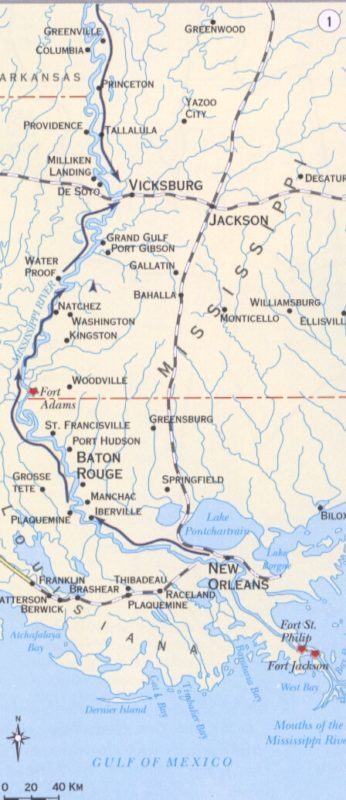Farragut Moves North
Once New Orleans was securely in Union hands, Captain Farragut sailed his fleet north. He first target was the Mississippi River port city of Baton Rouge. The capital of Louisiana it was not prepared to repel an attack.
So, unprepared to defend itself, the authorities there surrendered the city to Farragut without a struggle. Once this was accomplished, Farragut moved his fleet to Natchez. The largest Mississippi River port city, it was the home of more cotton millionaires than any other city in South. It too surrendered without a shot being fired.
With the waters of the Mississippi River high, Farragut them moved further North to attack the second largest city in Mississippi, the river port of Vicksburg.

Lincoln had told his generals of Vicksburg,
“See what a land these fellows hold of which Vicksburg is the key. Here is the Red River which will supply the Confederacy with cattle and corn to feed their armies. There are the Arkansas and the White Rivers, which can supply cattle and hogs by the thousands. From Vicksburg these supplies can be distributed by rail all over the Confederacy.
“Let us get Vicksburg and all that country is ours. The war can never be brought to a close until that key is in our pocket.”
In April of 1862, at Vicksburg, Farragut’s order to surrender was refused. Held off by the guns on the heights of the city and fearful of becoming stranded should the river waters recede, Farragut withdrew his flotilla of ocean-going ships.
Capture of the city would be left to Grant and his land force. It would elude him for another fourteen months, until July of 1863.
Meanwhile, a large Union river force was gathering to attack Memphis, Tennessee, the last Confederate held port on the Mississippi River north of Vicksburg.


 A Great Read! I couldn’t put this book down once I got started. The detail was great and I really like the main character, Michael. Knowing that so much research went into this book made it exciting to read!
A Great Read! I couldn’t put this book down once I got started. The detail was great and I really like the main character, Michael. Knowing that so much research went into this book made it exciting to read!